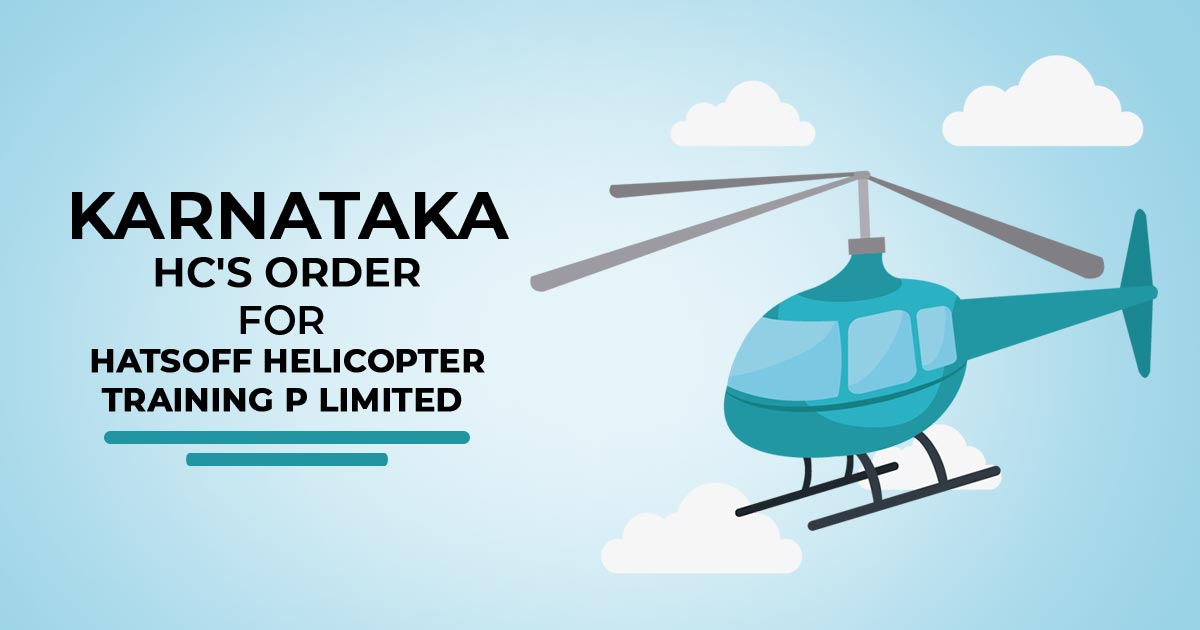
The Karnataka High Court has ruled that denying tax exemption to the government’s helicopter pilot trainer solely for the initial non-submission of Goods and Services Tax Identification Numbers (GSTIN) is unwarranted.
Justice B. M. Shyam Prasad, presiding over the case, highlighted that although the GSTIN for the recipient organization was not initially provided, it can be submitted later.
This delay in furnishing the GSTIN does not negate the fact that the training services for helicopter pilots were fully funded by either the Central Government or the State Government.
The petitioner/assessee, operating from 2018-19 to 2021-22, offered “bulk simulator training services” to helicopter pilots from the Indian Air Force, Indian Army, Indian Navy, and various defence establishments, including some state government departments.
The court emphasized that services rendered to the Central Government/State Government/Union Territory Administration for training purposes, with the total expenditure covered by these entities, fall under the exemption provided by Entry No.72 of Notification No.12/2017 dated June 28, 2017.
The applicant has raised invoices for the recipient organizations without mentioning GSTIN.
The initiation of proceedings involves the issuance of DRC-1A and DRC-01, alleging that the petitioner incorrectly discharged tax under IGST instead of SGST and CGST, leading to a loss for the State Exchequer. Authorities initiated these proceedings based on the view that, in the absence of GSTIN and PAN, the place of supply, according to Section 12(5) of the IGST Act, is deemed to be in Karnataka. Consequently, the petitioner’s services to defence establishments in Delhi, Jharkhand, and other locations are considered non-interstate supplies.
The petitioner argues that the provisions of the Central Goods and Services Tax Act, 2017/Karnataka Goods and Services Tax Act, 2017 do not specify that the recipient must be registered with a PAN; it could also be a TAN.
The petitioner maintains that invoiced supplies were extended to recipient establishments possessing either PAN or TAN. Although supplies to PAN-registered establishments have been adjusted, proceedings related to TAN are ongoing. Furthermore, the petitioner asserts good faith in not specifying the GSTIN acquired by the recipient organizations.
The petitioner contends that had the department been able to extract necessary details such as TAN and the accurate place of supply from the records, the benefit of exemption could not have been denied.
The department argued that the proper registration of the receiving organization is crucial as it serves as a determining factor in establishing the place of supply according to Section 12(5) of the IGST Act. Since the petitioner did not provide a GSTIN, the supply is deemed an intrastate service subject to KGST/CGST. The department contends that, without the GSTIN, the petitioner is obligated to pay GST within the state, as the place of supply is considered to be in Karnataka.
The court remarked that if the petitioner, despite the initial non-submission of the recipient organization’s GSTIN, later provides the same and demonstrates that the services of imparting training to helicopter pilots are entirely funded by the Central Government or the State Government, the third respondent must decide whether the exemption outlined in GST Notification No.12/2017 dated June 28, 2017, can be denied. These considerations are crucial for a thorough adjudication of the matter.
| Case Title | M/S Hatsoff Helicopter Training P Limited Versus State Of Karnataka |
| Order No. | No. 24699 Of 2023 |
| Date | 27.11.2023 |
| Petitioner By | K.S. Naveen Kumar, Dakshina Murthy R. |
| Respondent By | Shamanth Naik |
| Karnataka High Court | Read Order |








